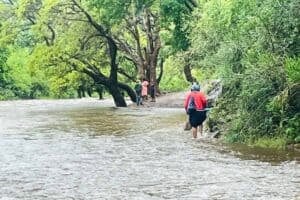Police officers fear to go into buildings as criminals rule there.

The trashed and abandoned Soshanguve train station has not only affected the local economy in the area, but has turned into a hotspot where criminality reigns.
Known as one of the most sophisticated and busiest stations less than five years ago, the train station is now dubbed “ghost town” by residents after it was shut down as part of the government’s coordinated response to the global health panic of early 2020.
Stripped during Covid lockdown
Following the lockdown period, most pieces of valuable metal and material were stripped from fixtures, and when the easing of government restrictions on movement came, there was little left of the infrastructure around the station.
As authorities let stations stand idle, thieves chipped away at the carcass, leaving only the rail track for trains going to other stations.
ALSO READ: R60 billion needed to restore SA’s crumbling rail network
Bonolo Masemola, a resident from Sunvalley in Mabopane, just a street away from the station, said in the past four years they’ve seen the station go from packed and busy to being a graveyard littered with faeces and heaps of refuse.
“They have robbed people, they’ve vandalised the place and left it to fall into ruin. This is not considered a train station anymore because the trains just pass going to the next station. It never stops,” she said.
“We have seen on the news that Prasa [Passenger Rail Agency of SA] is fixing local train stations across Pretoria, but for the past three years we haven’t seen any movement except for the thugs who go in and out of this place.”
Security officers lock themselves in
Another resident, who did not want to be named due to fear of being victimised, said despite having visible security presence during the day “at a certain time they disappear and lock themselves in because this place is not safe”.
“I was raped here last year and no one could help me because no one wanted to go in there. I had just gotten off a taxi and three young men pulled me up the stairs until we got to one of the vandalised toilets,” she recalled.
“And when I reported it, one of the police officers expressed her concern about the issue, but also said to me most officers were scared to go into such places because they are not guarded and no one knows what to expect.”
ALSO READ: Prasa trains safe for passengers to ride again, says regulator
Meanwhile, the station which serviced more than half of the blocks in the area – Sunvalley, Block D, Block M, Block B and Block C – has not only left residents living in fear but also affected many financially.
Families’ incomes affected
According to Phindi Masemola, a former vendor outside the station, this has taken food out of the mouths of many families, including hers.
“It was very convenient for us and the commuters as well. We lived in the area so didn’t have to travel far to push our stock and businesses and, as for the commuters, they would have most of what they needed at their convenience at a very affordable price,” she added.
“It was not just Covid. Even after the pandemic we tried to go back and realised that we were only putting our lives in danger but no one felt safe enough to even get off at that station.”
ALSO READ: WATCH: ‘People’s Train’ makes the people walk on launch day
She said after seeing a number of stations getting fixed, “the Kopanong station, Mabopane stations and others we were very hopeful that our station would also make its debut but nothing”.
“When we asked if we were next all we heard was the councillors were supposed to fix the stations and not the City or even Prasa.”
She also said a station that in late 2020 was almost untouched is now only identifiable as a train station by the sign standing on the side of the road.






